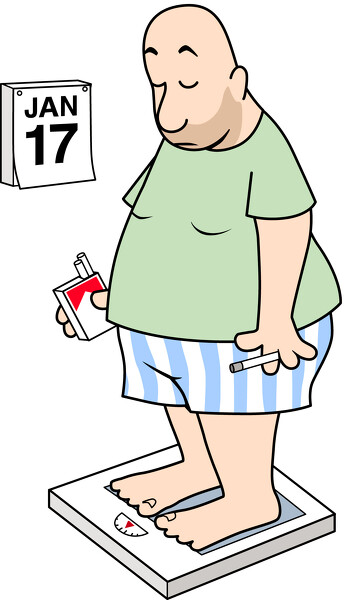
Experts say choosing an attainable, realistic and healthy New Year's resolution takes a bit more thought than the typical goals of losing weight, quitting smoking or saving money.
CELINA - With two weeks remaining in January, it may be time to ask: "How are those resolutions going?"
Experts say choosing an attainable, realistic and healthy resolution takes a bit more thought than the typical goals of losing weight, quitting smoking or saving money.
Resolutions that stick often require smaller, more specific goals. For some, those resolutions can mean a refresh, while others may feel pressure and dread. Another option is to dust off a passion project and pick up a hobby to get a renewed sense of purpose.
Dave Hochstein, associate professor of psychology at Wright State University - Lake Campus, said while a majority of Americans last year made a resolution and kept it, a larger percentage of Americans forwent the concept entirely.
"Based on Pew research from 2024, it appears that only about 30% of Americans make resolutions, but a majority of them, 87%, do keep at least some of them," Hochstein said. "My assumption would be that those who have made resolutions in the past and didn't keep them have stopped trying, so it bumps that number up."
Of the 70% of Americans who did not make a resolution in 2024, 56% said their main reason for not doing so is they simply do not like to make resolutions, according to the research.
"Twelve percent of those who didn't make a resolution say they break them too easily. Nearly as many (9%) say they couldn't think of a resolution to make, while 6% say they forgot to make one this year. Another 17% say they have another reason for making no resolutions," per the research.
Hochstein said it's human condition to crave control and order, and for many the new year is the perfect time to do so.
"People have an inherent drive to have control over their own lives, and when people want to make a change, they often will pick an important date to start fresh with a clean slate, sometimes called a 'fresh start effect,'" he said. "Instead of making small gradual changes, having that specific date when we make a big change increases motivation, because it's almost as if we can then disconnect from the past."
For example, a common mentality is that "in 2024, I didn't make the changes I wanted, but starting 2025, I have a clean slate and I can start over."
He said successful resolutions, like any other long-term plans, depend on several factors.
"Those who are successful tend to have a greater belief in their ability to be successful, the presence of skills required to be successful, social support and readiness to make the change."
Hochstein said more specific goals like "I will swim 30 minutes each morning at the YMCA" tend to be more successful than a larger goal of "I will exercise more."
"Making interim goals also can help," he said. "Saying that you'll have no cigarettes this week, and then saying it again each week, is more effective than saying you won't have any this month. This ties in with giving yourself rewards for meeting interim goals, instead of one big reward at the end."
Studies show that approach-oriented goals are more successful than avoidance-oriented goals, he said. This can include, "I'll be more active" versus "I won't be as inactive."
"Another way to increase the chances of success is to think about what happens if there's a failure," he said. "If you are trying to quit smoking, plan for what you'll do if you do smoke a cigarette, instead of letting that derail your entire resolution."
For those who find resolutions daunting, Hochstein said it's important for them to remember why they want to better themselves. He recommended focusing on the reason for wanting to change and to not let a lapse in judgment derail the entire process.
"Don't give up on the exercise routine just because you took a day off," he said. "I'd also suggest prioritizing smaller goals if the larger ones are too daunting. Again, breaking the larger goals into several smaller goals is much more effective, and less daunting, than just one big goal."
The Grand Lake area is home to a wealth of hobbies, including the tried and true classics like reading and painting. Other examples include crocheting or knitting, pottery, making a sourdough starter, buying a houseplant or woodworking.
A large percentage of hobbies rely on concentration and passion, which can help with mental health.
Ali Arnold, owner of Lunar Leaf, an area houseplant business, said plants are therapeutic.
"It is gratifying to take the time to care for something and watch it grow. And being surrounded by lots of green this time of year is a nice break from the dreary winter. Some house plants can also filter and purify the air in your home."
Arnold said someone might want to take up plants as a hobby because "some plants are so striking, and when they are grouped together it's very much like a living art piece in your home."
For those with green thumbs but who are apprehensive, she suggested starting small with a plant or two. She recommended a reliable starting plant such as a snake plant or any variety of pothos, which are both low maintenance and very forgiving.
Abigail Eversman, owner of crochet business Abigail's Cute Creations, suggested crochet as a new hobby for those with anxious minds or fidgety hands.
"To me, it's a stress relief," she said. "I guess I definitely like to do it when I'm a little bit more stressed. It also takes up some time."
Eversman said she enjoys the flexibility the hobby provides, saying she can make whatever she wants whenever she wants.
Megan Tuttle, co-owner of Grains of Love, an area sourdough business, also pitched her passion as a great hobby - especially as a stress reliever.
"Sourdough is a great hobby to get into. Anytime you can work with your hands, it can be very therapeutic," she said.
Tuttle said the health benefits of the product allow her to rest easy in knowing what she is putting into her body.
Sourdough promotes gut health, is easier for the body to digest, has a low glycemic index so it doesn't spike blood sugar, and has fewer preservatives, she said.
"Today, there is so much additives in our foods, and learning to bake sourdough bread gives so many options for you," Tuttle said. "Each time you bake or make something, you learn from that, so it's like a constant experiment."
Because hobbies are meant to promote joy and allow for creativity, Tuttle said it's key to not seek perfection.
"It's a journey that you learn as you go," she said.

